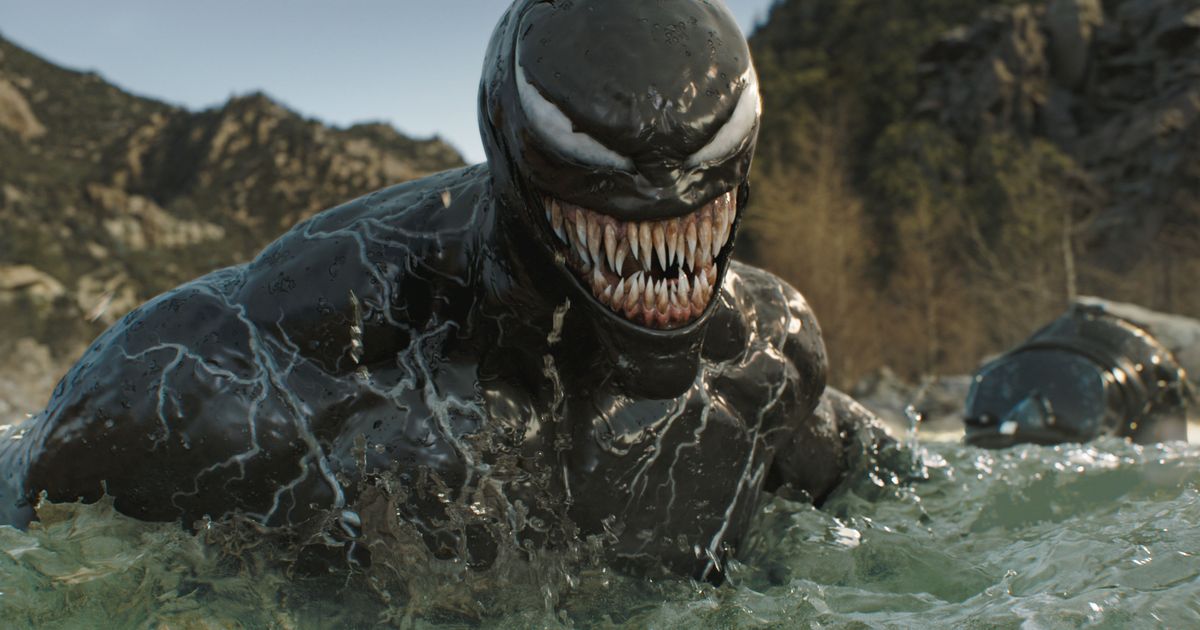Venom: The Last Dance begins the way so many promising movies do: with the villain explaining what his deal is in an opening monologue that was clearly added in because either test audiences or studio executives found him too confusing. The thing is it’s no less confusing for being laid out in flat terms over a montage of Frank Frazetta–y imagery of a savage fantasy wilderness. The villain, Knull (Andy Serkis), is a godlike figure who apparently predates the universe; he created and then was betrayed and imprisoned by the race of alien symbiotes that Venom belongs to. In the movie, he manifests as a mass of dirty-blond hair hunched in the middle of a swamp. As Venom: The Last Dance progresses and it becomes clear that Knull is just going to remain in that swamp and dispatch portal-hopping spider-lizard-monster things to do his bidding, you might start to get that sinking feeling that accompanies so many late-period superhero movies, when you realize that half of the shit happening onscreen is in service to some future installment that may or may not ever arrive. Venom: The Last Dance is supposed to be the end of a trilogy — it’s right there in the title — and yet it floats some future big bad seemingly out of habit, like the need to never resolve things is a feature and not a bug of these movies, a promise that next time, things will actually get good.
Have any of the Venoms been good? The first one was essentially a Madame Web–quality enterprise held together by Tom Hardy’s decision to play his character’s transformation from investigative journalist to carnivorous vigilante as a one-man buddy comedy. The subsequent follow-ups have had the misfortune of being in on that joke and leaning into it with increasingly goofy bits like Venom cooking breakfast (which happens in Venom: Let There Be Carnage) and Venom dancing to ABBA (as he does in Venom: The Last Dance, which finds screenwriter Kelly Marcel stepping up to directing duties). Hardy has remained compelling throughout and spends most of this new movie hung-over in cargo shorts and a Hawaiian shirt, getting yanked from location to location while looking like he’s about to hurl — a comic-book hero who never gets to look cool. But Hardy is one of the great leading weirdos of our era, and the fact that he has spent years now making these half-hearted affairs remotely watchable doesn’t actually feel like much of an accomplishment. Three features is a lot to hang on Hardy doing a digitally enhanced version of a hand-puppet act. There’s a certain point at which you have to wonder if, instead of applauding his ability to sneak a subversively odd performance into a franchise product, he and everyone else involved wouldn’t be better served just making a movie that’s daring to begin with.
Venom: The Last Dance is, as much as it’s anything, a road-trip movie that begins with Hardy’s Eddie Brock on the run in Mexico. He attempts to head to New York and instead ends up in the Nevada desert, where scientist Dr. Teddy Payne (Juno Temple) and General Rex Strickland (Chiwetel Ejiofor) are running Imperium, an underground program for the study of symbiotes next to the soon-to-be-decommissioned site of Area 51. This is less a journey than a plot convergence. While Strickland and his special-ops forces have been tracking Eddie in their efforts to gather symbiotes, Eddie and Venom have also attracted the attention of one of Knull’s henchmonsters for reasons that even the characters within the movie have trouble explaining. Basically, the Eddie-Venom combination is key to Knull’s freedom, though the henchmonsters, which are called Xenophages, can home in on the duo only when they’re in full black, toothy form. This is regrettable because Venom only really looks good that way, though the effects are in general a little less janky in this installment than the previous two. Instead, we get a lot of Venom as a floating head coming out of Eddie’s back, as well as Horse Venom, Fish Venom, and Frog Venom, as the pair try to evade capture by Imperium and by the Xenophages, which can leap thousands of feet, can’t be killed by traditional means, and have a mouth that operates as a wood chipper for flesh.
The solution for the problem is that Eddie and/or Venom has to die, an issue that the entire movie tries to pretend isn’t obvious in order to include digressions about the death of Dr. Payne’s brother in a lightning accident or about a road-tripping hippie family led by an aliens-obsessed Rhys Ifans or a sequence early on in which the movie retcons the post-credits scene from Spider-Man: No Way Home while Venom howls about how he’s “so done with the multiverse shit.” The lack of coherent stakes matters less than the general feeling that the movie is bad on purpose, in addition to being bad accidentally, which is the only way to explain why there’s a shadowy character in a control booth whose identity is never revealed and whose presence is never explained. It makes weak gestures toward wanting to be about regret and mortality, then includes a montage cut to Maroon 5 as a fuck-you for thinking there was ever any intention of getting sincere. Venom: The Last Dance isn’t a lark but a smirk to let you know that while everyone may be aware of what it’s up to, you’re the sucker who bought the ticket.

